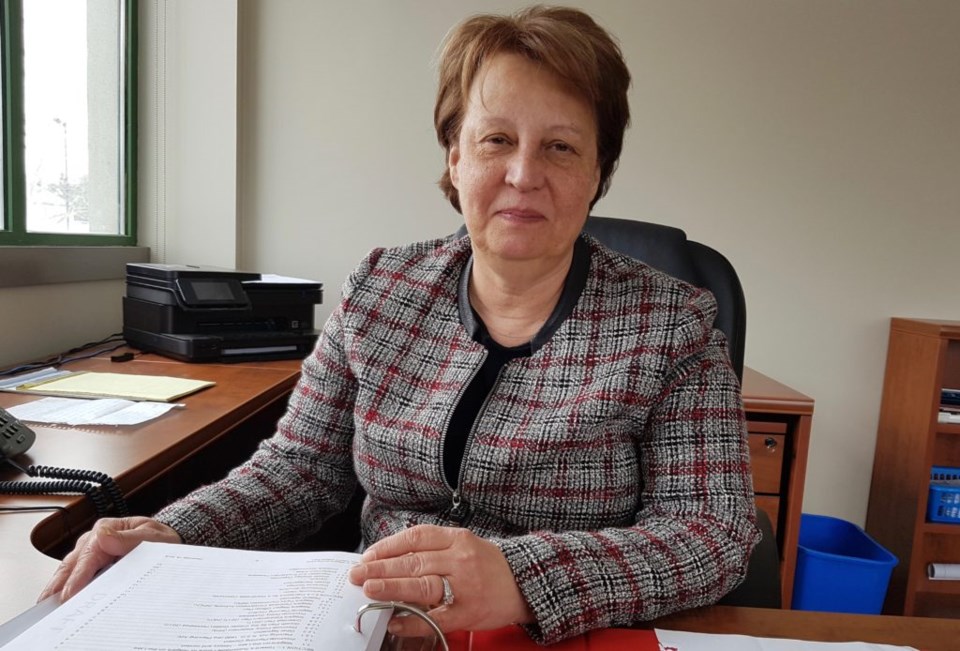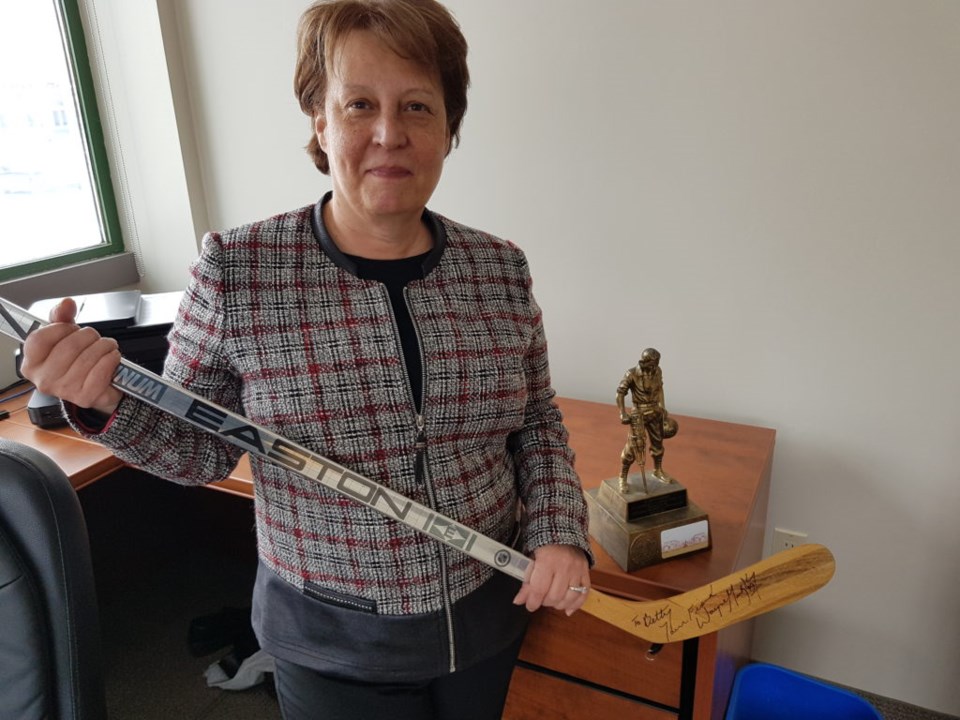
Lord Mayor Betty Disero is about a week away from her 100th day as the Lord Mayor of Niagara-on-the-Lake, and in the tradition of arbitrarily assessing a political term at this particular milestone, she was willing to talk about the work of the town’s new council so far and the whirlwind of activity that has surrounded it.
In addition to the regular committee-of-the-whole and council meetings since Dec. 3, when councillors were sworn in and officially took over the job of running the town, there have been six workshops, three special council meetings called and several public meetings held. While it might have seemed like an initiation by fire for first-time councillors, it was nothing that would faze a seasoned veteran such as Disero, with more than 30 years experience in the public arena.
This Monday morning, she was following her usual monthly routine — if there is a committee-of-the-whole meeting planned for the evening, she can be found at Bliss in Virgil, a local beauty salon, getting her hair done. The salon is closed Mondays, but owner Sandra Cocetti opens the door for Disero, who enjoys a rare time of quiet while having her hair attended to.
Reflecting over the three months or so since councillors were sworn in, Disero said, their three main accomplishments have been to pass a tree bylaw — which was reviewed at council Monday night, with some discussion of minor changes — an interim control bylaw, and a difficult budget, says Disero.
Typically staff will come up with a budget that represents an 11 or 12 per cent increase over the previous year, but there are usually “controllable items,” — the wish list councillors have presented for inclusion in the budget — that can be sorted through to whittle down the increase.
This year, she said, was more of a challenge, with non-controllable items such as staffing issues and obligations left over from the previous council making up a large portion of the increase.
“We had to look at other things to cut, such as the contribution to the capital budget, the largest item in the budget, which means we won’t be able to do a lot of the maintenance we had hoped. But we have a four-year mandate, and we have to get the budget to where the management of assets is moving forward — the potholes are being fixed, facility maintenance is looked after — to be sure the Town assets aren’t crumbling. We will do that — we have three more budgets to achieve that.”
Disero said the transition has not been difficult, despite so many new faces on council.
“I love my council. They work hard, they do a lot of research and see what other municipalities are doing, so we’re not re-inventing the wheel. They have some really good ideas to solve some difficult issues. Sometimes the challenge is to hold them back, they want to do so much. As lord mayor, trying to set priorities is a little bit of a challenge.”
By next week’s council meeting, Disero wants to have a work plan of what is expected to be tackled in the coming months and by whom. Councillors will have the opportunity to discuss and adjust it, she said.
“It sets the pace for council, it sets the pace for staff so they know what to expect, and it also helps the public to know what we intend to do, when we’ll be doing it, and tells them who to call if they want to talk about it.”
The strategic plan process hasn’t begun yet, but it’s coming along, she said, and there will be a recommendation for getting quotes for a consultant to guide the process by Monday’s council meeting.
The strategic plan, she said, “may or may not change the work plan, but we needed to get something done right away.”
Also as lord mayor, Disero said, “I have the responsibility to ensure everything we do is done in public, and with community engagement when it’s something important. We’re making decisions that affect people’s lives, and it’s important we go back to them and let them voice their concerns. We have really smart residents, and sometimes they have great ideas that make our decisions even better.”
The Town has been going through the education portion of all new committee members, says Disero, “and we’re seeing some really positive things.”
The agricultural committee has had two important jobs: one to deal with consolidating and getting input into changes to the official plan, which has to be completed in a very short time; and the other is dealing with zoning bylaws — also with a quick turn-around.
The interim control bylaw, which puts a “pause” to development, is a move council made to protect heritage, allowing them to look at what development is compatible in the heritage area.
“It gives us a chance to look at the ambience we want to achieve. If we can do that without threat of development hanging over us, we’ll make better decisions,” said Disero.
“We’re talking with lawyers and the home builder association about what we’re trying to accomplish. It’s not the intention of council to stop developers — we just want the opportunity to manage development so things don’t get so out of hand.”
The interim control bylaw holds everything in place until the town finishes its review, she said, and that should be completed this spring.
No discussion about heritage and development is complete in NOTL without mention of the Randwood Estate and six-storey hotel proposal. It is the subject of an appeal by the owner to the Local Planning Appeal Tribunal because the Town didn’t deal with the application within a 150-day deadline. The Town’s intention to designate four properties has also been appealed by property owner Benny Marotta of the Two Sisters Resort. In addition he has launched a lawsuit against the Town, saying the designation initiative was not carried out properly. There is money that has been put away in a reserve account to pay for Ontario Municipal Board hearings, now replaced by the tribunal — $150,000, Disero believes — which she expects will be used to pay for the Randwood appeals. At the moment, she said, lawyers and staff are preparing the Town’s response.
“What’s happened in the past is council has not wanted to go to the board. The past term of council was hesitant to challenge the development community,” she said, “possibly for fear of losing, or because they didn’t want to go against staff recommendations. This term members of council are more aggressive in the protection of our community. With Randwood, there hasn’t been a staff report on the application — that’s the reason for the appeal.”
Randwood is the example that keeps coming up in terms of preserving heritage, said Disero, “but there is so much more than that. We have so many estate lots to protect. In Virgil there’s a desire to designate the school building.”
The current members of council have shown their commitment to preserve heritage, she said, as each of them promised during their election campaign, but that doesn’t mean everyone agrees with them.
“This is such a diverse community. No matter what stand you take, someone will oppose it. We need to look at the larger picture, to see our long-term vision.”
Disero’s work plan is geared to do that for council, looking at three main items: the official plan and policies put in place with respect to farming; economic development to increase the industrial and commercial tax base, which will provide jobs and help pay for the services residents expect; and looking at what assets are necessary for a healthy community, such as daycare and health care.
“If we put all of those together, the public will start to see our vision for the NOTL of the future.”
However, looming over the town is the provincial government review of governance and service delivery.
While the past history of amalgamation raises questions about its effectiveness, Disero said when it occurred in Toronto there was no streamlining of services beforehand. “We ended up with higher costs for a lower level of services. The Province needs to look at all the services in Niagara and then look at next steps. Toronto is still trying to deal with the effects of amalgamation, and that occurred nearly a generation ago.”
With the intention of the review still unclear, it may be Niagara municipalities will be left as they are, with a regional services board, she said. “Nobody knows what their plans are. But we need to work on a response — we can’t just say we don’t want amalgamation, we need to have facts to present to them. And again we have some really smart people in town to help us.”
As a seasoned politician, Disero said there isn’t much on a political level that can surprise her, “but this provincial review was a surprise. It’s a big concern for all of us. My hope is we’ll have public discussions, and community input in our response to the Province.”
The fact that there is still some division in town, following an election that seemed particularly nasty, is not a surprise.
“There is always going to be some divide. Nobody’s going to like everything we do. But I’m thrilled by the number of people who tell me how happy they are with what we’re doing. That we’re not paying to hire consultants and researchers for the economic development committee. That we’re finding and using the strength in our community, the people and resources we have here. My whole adult life has been in the political realm and nothing much surprises me any more. What I’ve learned is to keep moving forward. We’ve got council and staff working together with goals and objectives in front of them. At the end of the day everyone wants to feel the work they do is meaningful, and this council has shown staff their opinions are valued.”
Disero says as lord mayor she feels she’s been “a little harsh” at times — this was said before a brief war of words at Monday night’s committee meeting over a point of order — “and I’ve sometimes had to say ‘you can’t do that,’ everything has to be open, transparent and with community engagement. I might be a little strong in my explanations. The learning curve for first-time councillors is they’re used to being able to ask questions and get answers, and it can be a little frustrating at times, but they’re smart, they’ve learned quickly. It’s not that they have to change, they just have to find that sweet spot, that balance where council and staff can work together.”
Disero’s office on this Monday morning was spotless and impersonal — but it wasn’t going to stay that way for long.
After three months of occupying the office of lord mayor, she was finally making it look like she belongs there. A pink plastic bin filled with memorabilia, certificates and awards was being emptied, and a hockey stick — signed and given to her by Wayne Gretzky when she was a Toronto politician, although she would meet him years later on her NOTL turf at the ground-breaking for his winery — was in need of a home.
Although it seemed she was ready to move in and symbolically make the office hers, she said, “really, I just wanted to get this stuff out of the house.”C
